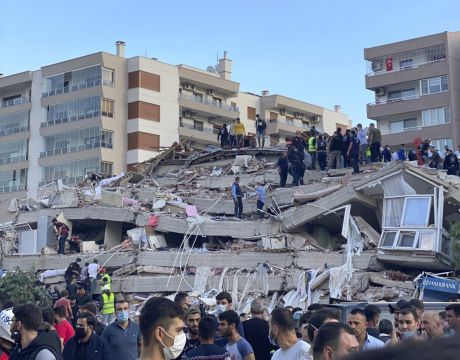A strong earthquake has struck in the Aegean Sea between the Turkish coast and the Greek island of Samos, killing at least 19 people and injuring hundreds amid collapsed buildings and flooding, officials said.
A small tsunami struck the Seferihisar district south of Izmir, the city in western Turkey that was the worst affected, said Haluk Ozener, director of the Istanbul-based Kandilli Observatory and Earthquake Research Institute.
At least 17 people were killed in Izmir, Turkey’s third-largest city, including one who drowned, and 709 were injured, according to Turkey’s Disaster and Emergency Management Presidency (AFAD).

Turkey’s President Recep Tayyip Erdogan, speaking in Istanbul, said 438 were injured with five undergoing surgery and eight in intensive care.
On Samos, where a tsunami warning was issued, two teenagers died after being struck by a wall that collapsed.
Prime minister Kyriakos Mitsotakis tweeted condolences, saying: “Words are too poor to describe what one feels before the loss of children.”
At least 19 people were injured in Samos, with two, including a 14-year-old, being airlifted to Athens and seven hospitalized on the island, health authorities said.

Izmir governor Yavuz Selim Kosger said at least 70 people were rescued from wrecked buildings, with four destroyed and more than 10 collapsed.
Search and rescue efforts were under way in at least 17 buildings, AFAD said. Turkish media showed rescuers pulling people from the rubble, and smoke rose from several spots.
The earthquake, which the Kandilli institute said had a magnitude of 6.9, was centred in the Aegean north east of Samos at a depth of 16.5 kilometres.
It was felt across the eastern Greek islands and as far as the capital Athens, and in Bulgaria.

In Turkey, it was also felt across the regions of Aegean and Marmara, including Istanbul. Istanbul’s governor said there were no reports of damage in the city, Turkey’s largest.
Videos on Twitter showed flooding in the Seferihisar district, and Turkish officials and broadcasters called on people to stay off the streets after reports of traffic congestion.
Greek seismologist Akis Tselentis told state broadcaster ERT that due to the shallow depth of its epicentre — roughly 10 kilometres — potentially powerful aftershocks could be expected for several weeks.
On Samos, damage was reported to buildings and roads, and residents were warned to stay away from the coast for fear of a tsunami. Water rose above the dock in the main harbour of Samos and flooded the street. Residents also were told to stay away from buildings amid aftershocks.

In a show of solidarity rare in recent months of tense bilateral relations, Greek and Turkish government officials issued mutual messages of solidarity.
Turkey’s communications director Fahrettin Altun tweeted: “This tragedy reminds us once again how close we are despite our differences over policy. We’re ready to help if Greece needs it.”
Mr Mitsotakis tweeted that he had phoned Turkish President Recep Tayyip Erdogan “to offer my condolences for the tragic loss of life from the earthquake that struck both our countries. Whatever our differences, these are times when our people need to stand together”.







